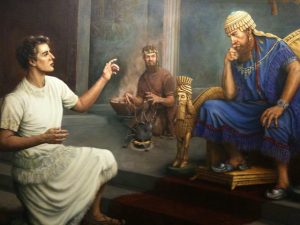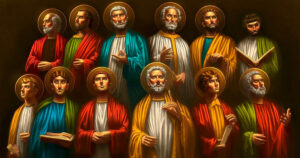When King David addressed the special assembly gathered to observe the coronation of his son, the man after God’s own heart addressed the future king:
1 Chronicles 28:9 (NASB) “As for you, my son Solomon, know the God of your father, and serve Him with a whole heart and a willing mind; for the LORD [YHWH, Yahweh] searches all hearts, and understands every intent of the thoughts. If you seek Him, He will let you find Him; but if you forsake Him, He will reject you forever. (emphasis added)
 King David cautioned his son that he should willingly and whole-heartedly serve Yahweh for He knows what is in the hearts and minds of all men. To be sure, no one can hide their actions or intentions from God:
King David cautioned his son that he should willingly and whole-heartedly serve Yahweh for He knows what is in the hearts and minds of all men. To be sure, no one can hide their actions or intentions from God:
Hebrews 4:13 (NIV) Nothing in all creation is hidden from God’s sight. Everything is uncovered and laid bare before the eyes of him to whom we must give account.[1]
Years later, at the dedication of God’s temple, King Solomon acknowledge, like his father before him, that the incomparable God is the only one who knows the hearts of all men:
1 Kings 8:23 and 39 (NASB) “O LORD, the God of Israel, there is no God like You in heaven above or on earth beneath…39 then hear in heaven Your dwelling place, and forgive and act and render to each according to all his ways, whose heart You know, for You alone know the hearts of all the sons of men[2]
God searches the hearts and minds of all men
Indeed, Scripture often speaks of God’s ability to see that which is hidden in the inner man:
1 Samuel 16:7 (NASB) But the LORD said to Samuel, “Do not look at his appearance or at the height of his stature, because I have rejected him; for God sees not as man sees, for man looks at the outward appearance, but the LORD looks at the heart.” (emphasis added)
Psalm 44:20-21 (NASB) If we had forgotten the name of our God or extended our hands to a strange god, 21 would not God find this out? For He knows the secrets of the heart. (emphasis added)
Psalm 139:1 (NASB) O LORD, [Yahweh] You have searched me and known me. (emphasis added)
Acts 15:8 (NASB) “And God, who knows the heart, testified to them giving them the Holy Spirit, just as He also did to us (emphasis added)
1 Thessalonians 2:4 (NASB) but just as we have been approved by God to be entrusted with the gospel, so we speak, not as pleasing men, but God who examines our hearts. (emphasis added)
But there are a few Scriptures where Jesus is said to know the hearts and minds of men, as well. For example:
Luke 9:46-48 (NASB) An argument started among them as to which of them might be the greatest. 47 But Jesus, knowing what they were thinking in their heart, took a child and stood him by His side, 48 and said to them, “Whoever receives this child in My name receives Me, and whoever receives Me receives Him who sent Me; for the one who is least among all of you, this is the one who is great.”
 How did Jesus know what only God can know? Some conclude it must be because Jesus is God and therefore, omniscient. Especially if they have been taught to interpret Scripture through a Hellenized lens as the Church Fathers did. If so, a cursory look at these passages may lead one to this conclusion. However, a more thorough examination of Scripture reveals that Jesus is not God, but the one sent by God to accomplish His will.
How did Jesus know what only God can know? Some conclude it must be because Jesus is God and therefore, omniscient. Especially if they have been taught to interpret Scripture through a Hellenized lens as the Church Fathers did. If so, a cursory look at these passages may lead one to this conclusion. However, a more thorough examination of Scripture reveals that Jesus is not God, but the one sent by God to accomplish His will.
How then could Jesus know the hearts of men?
There are two primary reasons why the human Messiah was able to know the inner thoughts of other men. First, because he is the anointed prophet of God. Second, because God appointed him to be the judge of the living and the dead.
The Spirit-filled Prophet of God
According to Unger’s Bible Dictionary, a prophet is “one who is divinely inspired to communicate God’s will to his people, and to disclose the future to them.”[3] Moses foretold that God would send a prophet like him from among the people.[4] This prophet would be God’s spokesman:
Deuteronomy 18:18-19 (NASB) ‘I will raise up a prophet from among their countrymen like you, and I will put My words in his mouth, and he shall speak to them all that I command him. 19 ‘It shall come about that whoever will not listen to My words which he shall speak in My name, I Myself will require it of him.
Many recognized Jesus to be the prophetic spokesman sent by God:[5]
Luke 24:19 (NASB) And He said to them, “What things?” And they said to Him, “The things about Jesus the Nazarene, who was a prophet mighty in deed and word in the sight of God and all the people (emphasis added)
 Moreover, they understood this prophet to be the Christ (Messiah). For example, when Jesus told the woman at the well things about her life that he could not have known in the natural, she acknowledged that he was a prophet and later rhetorically asked if he was the Christ:
Moreover, they understood this prophet to be the Christ (Messiah). For example, when Jesus told the woman at the well things about her life that he could not have known in the natural, she acknowledged that he was a prophet and later rhetorically asked if he was the Christ:
John 4:15-20, 25-26 and 29 (NASB) The woman *said to Him, “Sir, give me this water, so I will not be thirsty nor come all the way here to draw.” 16 He *said to her, “Go, call your husband and come here.” 17 The woman answered and said, “I have no husband.” Jesus *said to her, “You have correctly said, ‘I have no husband’; 18 for you have had five husbands, and the one whom you now have is not your husband; this you have said truly.” 19 The woman *said to Him, “Sir, I perceive that You are a prophet…25 The woman *said to Him, “I know that Messiah is coming (He who is called Christ); when that One comes, He will declare all things to us.” 26 Jesus *said to her, “I who speak to you am He.“… 29 “Come, see a man who told me all the things that I have done; this is not the Christ, is it?” (emphasis added)
By revealing hidden things, many came to believe that this prophet was the Christ, the Savior of the world:
John 4:39-42 (NASB) From that city many of the Samaritans believed in Him because of the word of the woman who testified, “He told me all the things that I have done.” 40 So when the Samaritans came to Jesus, they were asking Him to stay with them; and He stayed there two days. 41 Many more believed because of His word; 42 and they were saying to the woman, “It is no longer because of what you said that we believe, for we have heard for ourselves and know that this One is indeed the Savior of the world.” (emphasis added)
But doesn’t the fact that Jesus knew details about this woman’s life prove he is God? No, it doesn’t because God has used others to reveal “unknowable” things. For example, when King Nebuchadnezzar was troubled by dreams, he called for magicians, conjurers, sorcerers, and astrologers to interpret them. There was one caveat, however. The king refused to tell them the dream but required them to reveal both the dream and its meaning. When they failed to do so, Daniel was called in, and God granted him success. The prophet gave God the credit for revealing to him what he could not otherwise have known:
Daniel 2:27-28 (NASB) Daniel answered before the king and said, “As for the mystery about which the king has inquired, neither wise men, conjurers, magicians nor diviners are able to declare it to the king. 28 “However, there is a God in heaven who reveals mysteries, and He has made known to King Nebuchadnezzar what will take place in the latter days..
 Clearly, the reason Daniel knew “unknowable” things is because God had revealed them to him. Unfortunately, post-Biblical orthodoxy has mislabeled the same spiritual gifting in Jesus as divine omniscience.
Clearly, the reason Daniel knew “unknowable” things is because God had revealed them to him. Unfortunately, post-Biblical orthodoxy has mislabeled the same spiritual gifting in Jesus as divine omniscience.
With regard to the New Testament, Paul’s letter to the church in Corinth demonstrates that the revealing of men’s hearts by the Spirit of God played an important role in the first century Church:
1 Corinthians 14:23-25 (NASB) Therefore if the whole church assembles together and all speak in tongues, and ungifted men or unbelievers enter, will they not say that you are mad? 24 But if all prophesy, and an unbeliever or an ungifted man enters, he is convicted by all, he is called to account by all; 25 the secrets of his heart are disclosed; and so he will fall on his face and worship God, declaring that God is certainly among you.
In these examples, and there are more,[6] we see that the gift of prophecy[7] is one of the ways that God can work through man to disclose the secrets of other men’s hearts. Therefore, Jesus’ ability to know “unknowable” things makes him neither omniscient nor God.
God’s Appointed Judge
The second reason Jesus is able to discern what is hidden in men’s hearts is because God has appointed him Judge of the living and the dead. Jesus told certain Jews:
John 5:22-27 (NASB) “For not even the Father judges anyone, but He has given all judgment to the Son, 23 so that all will honor the Son even as they honor the Father. He who does not honor the Son does not honor the Father who sent Him. 24 “Truly, truly, I say to you, he who hears My word, and believes Him who sent Me, has eternal life, and does not come into judgment, but has passed out of death into life. 25 “Truly, truly, I say to you, an hour is coming and now is, when the dead will hear the voice of the Son of God, and those who hear will live. 26 “For just as the Father has life in Himself, even so He gave to the Son also to have life in Himself; 27 and He gave Him authority to execute judgment, because He is the Son of Man…30 “I can do nothing on My own initiative. As I hear, I judge; and My judgment is just, because I do not seek My own will, but the will of Him who sent Me.

As God’s appointed Judge, Jesus has been given everything he needs to render a just decision. He has been given authority by God, and as he “hears,” he judges according to the Father’s will. No wonder Jesus warned the church in Thyatira of the judgment that was coming. As God’s delegated adjudicator, he could see their hearts:
Revelation 2:21-23 (NASB) ‘I gave her time to repent, and she does not want to repent of her immorality. 22 ‘Behold, I will throw her on a bed of sickness, and those who commit adultery with her into great tribulation, unless they repent of her deeds. 23 ‘And I will kill her children with pestilence, and all the churches will know that I am He who searches the minds and hearts; and I will give to each one of you according to your deeds. (emphasis added)
As the Judge of all men, it is fitting, therefore, that the apostles asked Jesus to reveal who it was that should take Judas’ place:
Acts 1:24-26 (NASB) And they prayed and said, “You, Lord, who know the hearts of all men, show which one of these two You have chosen 25 to occupy this ministry and apostleship from which Judas turned aside to go to his own place.” 26 And they drew lots for them, and the lot fell to Matthias; and he was added to the eleven apostles.
God made Jesus His spokesman and delegated the role of judge to him. Thus, he is able, by the Spirit, to search men’s hearts and minds. Notice, however, that Jesus gives God the credit:
Luke 16:14-15 (NASB) Now the Pharisees, who were lovers of money, were listening to all these things and were scoffing at Him. 15 And He [Jesus] said to them, “You are those who justify yourselves in the sight of men, but God knows your hearts; for that which is highly esteemed among men is detestable in the sight of God.
But who is this God he refers to? Is it Jesus himself? Or the Trinity? No, rather from Paul’s personal example we see that this God is the God and Father of Jesus:
2 Corinthians 11:30-31 (NASB) If I have to boast, I will boast of what pertains to my weakness. 31 The God and Father of the Lord Jesus, He who is blessed forever, knows that I am not lying.
In other words, Paul appealed to the God and Father of Jesus who knows men’s hearts and therefore would know whether or not he was lying.
Like those who have gone before us, it is important that we, too, give God the Father credit for searching the hearts and minds of all men. Jesus doesn’t know everything, but God has granted him the authority and the ability to know what is hidden in the inner man. But ultimately, the glory belongs to God.
[1] See also Ecclesiastes 12:14, https://www.biblegateway.com/passage/?search=Ecclesiastes+12%3A14&version=NASB
[2] “You” in this passage is a singular, masculine pronoun. King Solomon was speaking to the one true God, not the triune God of the 4th century.
[3] Merrill F. Unger, Unger’s Bible Dictionary, (Chicago: Moody Press, 1975), p. 890.
[4] Deuteronomy 18:15; Acts 7:22.
[5] Luke 7:16; Acts 3:22-26; Matthew 16:13-14; 21:11.
[6] 2 Kings 5:1-27; Amos 3:7; Acts 5:1-11; 11:27-30, etc.
[7] 1 Corinthians 12:1-11; 14:1ff; Ephesians 4:11; 1 Peter 4:10-11.




The Bible records that certain individuals had more insight than others (cf. 1 Kings 14:5; 2 Kings 6:12; 8:11-12; Acts 5:3-5), but they were never said to be able to know the totality of the hearts of all people let alone the totality of just one of them (2 Kings 4:27).
Only God has this knowledge (1 Kings 8:39), and since the Lord Jesus possesses this same knowledge demonstrates that He is God.
Hi Marc,
I appreciate your interest in the website.
You’re correct, God alone knows the hearts of all men. And it is God’s prerogative to delegate this knowledge to His servants piecemeal or without limitation. In Jesus’ case, such knowledge is completely contingent upon the Father revealing it to him.
If, as you say, Jesus’ knowledge of men’s hearts proves he is God, then, conversely, the fact that he does not know all things (Matthew 24:36), even after he has been exalted (Rev. 1:1), proves that he is not God.
Again, thanks for your interest.
Cayetano,
Thank you for your interest in this subject!
Since the list of verses you cited to prove that Jesus is God was rather lengthy, I have chosen edit the entries so as to more efficiently respond. I have articles addressing each of these so called “proof texts” and hope you will take a few minutes to examine how they demonstrate that the Father alone is God, while Jesus is His human Messiah.
John 1 – Part 1, Part 2, Part 3
Genesis 1:26
Hebrews 1:8-13
Psalm 45 (see the link for Hebrews above)
Jesus is Almighty God
In addition, I believe you will find the articles on Jesus as the agent of God very helpful. Lastly, here you can find of list of Common Verses (used by some as so called “proof texts”) to help you see how they are better understood from a first-century perspective.
Thanks again for reaching out,
OGW